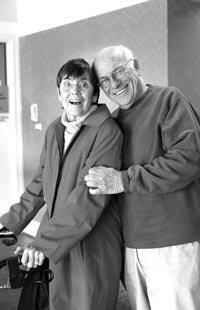Fast track: ALS drug moves forward
Getting a medication from drug trial to drugstore shelf can be a trial in itself, one local doctor has learned. But after a frustrating year in which a UVA ethics committee halted his project and four of his original subjects died from their disease, the study is now on a fast track.
"The FDA has been strongly encouraging me to develop this drug very quickly," says Dr. James Bennett, a UVA neurologist who has been working to develop a treatment for ALS. More commonly known as Lou Gehrig's disease, ALS is a fatal degenerative neurological disorder that robs its sufferers of the ability to speak, swallow, move, and, eventually, breathe.
Though Bennett is no longer overseeing the actual research on pramipexole, a drug he discovered languishing on the shelf of a German pharmaceutical company, he remains the drug's sponsor, a role usually reserved for large drug companies. He arranges supply of the drug, raises the money for research, and coordinates the extensive attendant paperwork.
In fact, with support now from both the FDA and the UVA ethics committee, the drug is currently being tested in one clinical trial at UVA and at several other locations around the country, and a second clinical trial for a higher dose of the drug– may soon be under way.
In addition, members of the original group of patients– which Bennett says has dwindled from 15 to 11– has had access to the drug since September on what the FDA terms a "compassionate use" basis. That designation is reserved for unproven experimental drugs approved for use in the terminally ill. Thanks to the FDA's approval, doctors around the country will also now be able to offer the drug to their own ALS patients, as long as they follow a certain protocol and collect data from those patients.
For Bev Nicola, one of the original participants, resumption of pramipexole came not a moment too soon. Stricken with ALS in 2003, the 65-year-old Richmonder has lost the ability to speak, swallow, and walk. (She believes the drug allowed her to articulate several words when she participated in the study last year.) Her ability to cough has also been severely impaired, and as a result, she was hospitalized with pneumonia for two weeks in the summer of 2005.
Since she resumed taking the drug– which acts as a "super anti-oxidant"– in September, she says, she is once again able to cough productively– something most people take for granted, but which for Nicola could be the difference between life and death.
"I haven't been able to do that in three years," she explains by email. "I'm feeling great."
It is difficult to determine whether Nicola is the only participant who is noticing improvements. Mary Jane Gentry– the other study participant The Hook interviewed for a February 24, 2005 cover story, "She's dying: His drug could save her"– had reported regaining use of her left hand following her initial treatment with pramipexole. But after UVA's ethics committee declined to renew Bennett's study, citing safety concerns, Gentry's condition worsened. She died on May 26, less than four months before the drug became available once more.
The list of study participants is confidential, and doctors and support staff say they are trying to remain objective until they have established scientific evidence the drug works.
"We're deliberately not talking about the study in our support group," says Cathy Easter, director of the Richmond office of the ALS Association, expressing concern about the "placebo effect," in which patients believe they are receiving effective treatment and therefore report improvement in their condition.
"One of UVA's issues was they felt that perhaps the patients were thinking they were receiving benefit," Easter says. "We're just trying to make sure that we're not putting anything into anyone's mind and that everything is strictly scientific."
Bennett, too, says that to protect his objectivity, he's not asking patients how they're feeling. But despite his cautious approach, he has high hopes for the drug.
"If we could extend the life of someone with ALS by one year," he says, "that would be significant."

Dr. James Bennett hopes to find a pharmaceutical company that will license the ALS drug he's developing.
FILE PHOTO BY JEN FARIELLO

Recovered from a bout of pneumonia, Bev Nicola says she's "feeling great."
FILE PHOTO BY JEN FARIELLO